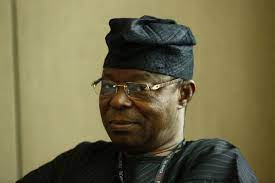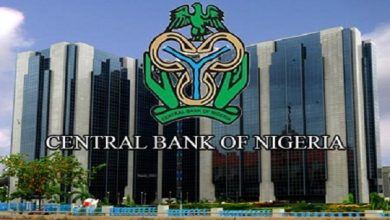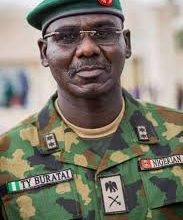Fears Over Otudeko’s Possible Emergence as Board Chairman of FBNH Again

Fear, anxiety and apprehension grip shareholders, banks and bank workers, capital market operators and even depositors as Oba Otudeko makes a dramatic return to First Bank of Nigeria as the biggest shareholder and his possible emergence as its Board Chairman
Amos Adetunji
The unanticipated return of Oba Otudeko, the man tagged corporate raider by his critics , as the biggest shareholder in First Bank of Nigeria, FBN may be legally justified, but many people both within the financial sector and outside have questioned its morality. For a man who served on the board of First Bank between May 1997 and December 2010, FBN Holdings from 2011 to 2019 as a board Chairman and later as a director when he was sacked by the Central Bank of Nigeria , there is definitely more than meets the eye with this unexpected return.
Naturally, Otudeko’s desperation to gain control again over FBN is causing ripples, and the effect is already spreading far and wide. During his first missionary journey before he was sacked from the board of FBN, Otudeko who wielded enormous powers was accused of sundry financial malfeasance, manipulations and unethical practices.
The negative impacts of such laxities’were palpable with FBN nearly in coma during his chairmanship of the Board ofDirectors of FBNH . Although the bank maintained healthy operations for some years under his leadership, in 2016 financial year when the CBN’s target examination was carried out it was revealed that the bank was in grave financial condition. Its capital adequacy ratio (CAR) and non-performing loans ratio (NPL) substantially breached acceptable prudential standards.”The problems at the bank were attributed to bad credit decisions, significant and non-performing insider loans and poor corporate governance practices.
The most unfortunate was that the shareholders of the bank and FBN Holding also lacked the capacity to recapitalise the bank to minimum requirements.
Specifically , the bank’s bad loan ratio hit a record 45 percent in 2015 ; it recorded a total loan impairment of over N565 billion between 2016 and 2020, with N376.4 billion, accounting for more than half the total loans impaired, provided for in 2016 and 2017 alone. The company’s profit before tax crashed to N10.2 billion in 2015. FBNH’s fortunes suddenly changed .FBNH’s share price fell to as low as N3 per share .The worst thing that happened was that the bank’s depositors money which is more than ten times the shareholders funds was highly endangered under the watch of Oba Otudeko Before his dismissal, Otudeko’s Honeywell Nigeria was hugely indebted to First Bank through insider borrowing, which affected the bank’s non-performing loan until the CBN placed the bank under a regulatory forbearance for some years.
Today, this takeover artist is haunted by his past activities, both at First Bank and in corporate Nigeria where he still commands some influence. For a man under whose watch First Bank of Nigeria Holdings, FBNH, suffered significant decline in fortunes and relevance, this may b e a time for stakeholders to be vigilant. Otudeko who remains a principal actor by virtue of his shareholding and connection at FBNH, is currently at the receiving end of a huge backlash over his past stewardship and unorthodox ways of doing business. The allegations against Otudeko include but not limited to the collapse of the bank’s corporate governance, especially with regard to insider loans,but heated power play between the board and the executive, his unethical dealings with other banks and diverting of assets and loans.
Where corporate governance is ignored like in FBNH , executive decisions are always in the interest of the few major shareholders; sometimes they are disastrously so .The handwriting was clear under Otudeko with the corporate governance framework and its principles dumped for selfish interests. Between the board of directors and the executive, it was a fight to finish.
The impacts of such powerplay between the Board and the executive may be very damaging .In the banking industry , the most disheartening issue is that the minority shareholders and other stakeholders particularly the depositors with the biggest stakes are usually at the receiving end of the battle for selfish interests pursued by the leaders .Most importantly , the depositors are the worst losers because the total deposits are usually in multiple of the shareholders funds .
If the board chairman wins the battle , he or she usually influences other directors who are members of the board and other shareholders to determine who becomes the chief executive as well as the executives directors. It is usually the other way round where the chief executive becomes excessively influential to appoint who becomes the board chairman.
Sequel to this , the whole affairs of the company might subject to manipulations to secure selfish interests of few individuals at the top . The account of the company might be manipulated to create of good performance , insiders loans are indulged upon just as the company’s loans might be pumped into fictitious companies . Such loans might be classified as non performing and ultimately written off .This might be a deliberate attempt to fraudulently divert the company’s money to private pockets .An unconfirmed report said before the full year results are declared certain amount is usually shared among the leadership at expense of other shareholders or stakeholders.
One critical effect the above scenario might be an imposition of incompetent board and executive leadership that consequently leads to non performance or eventually the death of such an entity However, where such collaboration is not possible what is observable is turbulence resulting from endless bickering and boardroom crisis or between the board and executive.
FBN’s poor corporate governance led to poor leadership and this was very clear during the tenure of the former ceo, Bisi Onasanya , the immediate predecessor of the current CEO brought in by the CBN . In fact , Onasanya was allegedly powerless under the board leadership of the powerful Otudeko .
The current fear over Otudeko’s return may not be farfetched. Getting a company’s board to pull the organization in the right direction can be a mix of balancing egos, clever horse-trading, and clarity of purpose of a few good fellows, male and female. Company boards should be the chief visioners of a business, they set the tone and the beat of a company, and everybody else adopts dance steps that match the rhythm.
Good organizations see workers pull together with calculated order, but great organizations yield to coordination, creativity, and purpose in an environment of controlled chaos. The dance steps are far from random, but they are equally not robotic; the absence of this clever and deliberate orchestration has formed part of the FBNH/FBN problem in the past two decades. A review of the lender’s recent history shows that each successive management has set out its own goals untied to either earlier or later corporate plans. The result has been a lack of corporate continuity with only episodic institutional progress
This eventually turned FBN a laggard of sort and a catch-up corporate entity in an industry where it had reigned supreme for several decades . The bank had been led by a crop leadership that is either ignorance of creating the future or incapable of doing so.
From the Bisi Onasanya era, the board was chaired by Oba Otudeko, who had significant influence over other directors and often acted with good intentions but suffered from common human foibles. Otudeko, who doubled as the Chairman of the Honeywell Group, had purportedly used his position at the financial Holdco to secure loans for companies related to him, thereby creating a classic ‘agency problem,’ meaning that the difference in the interest between the borrower and lender was unclear. Honeywell, for example, had loans that were restructured to allow for more convenient repayment terms over a longer tenor and under new repayment conditions.
This was not a problem on face value, but the trouble with Otudeko’s related-party bank facilities spoke more to collateral support than the intention to repay. In addition, FBN, contrary to best global practices, acquired an equity interest in the Honeywell Group, thereby creating a layer of conflicting interest. The issue of FBN’s equity interest in a related-party borrower and the non-perfection of its Holdco Chairman’s collaterals partly informed the CBN’s decision to relieve the non-executive directors of the Holdco of their board positions.
The Onasanya era was mixed, as it saw the bank tramp on new and bolder grounds in fresh lending to the Oil and Gas and Energy sectors, but the effort ended badly regarding the quality of the loans granted and the risk management deployed. The Onasanya achievements in cultural transition and capacity upgrades became marred by numerous delinquent risk assets (i.e., loans) and liquidity difficulties caused by an increasingly depressed economy, global economic disruptions (2015-2016), and poor revenue recovery in the power sector. The Onasanya epoch represented the strong, the weak, and the obscure parts of FBN’s recent lending history.
Under the current CEO , Dr. Adesola Adeduntan, it was a fight to the finish between him and otudeko Adeduntan had to navigate a different path of cleaning up the Augean stable by attempting to take on delinquent loans head-on. The effort at recovering sticky loan assets had at times placed the bank’s management in direct conflict with its Holding company’s previous board of directors. However, with the new Holdco board, things appear better.
Nevertheless, in some measure, the drama that saw the exit of the bank’s non-executive directors resulted from a powerplay between the bank’s management and significant insiders on the board of the Holdco. The political chess moves by both parties were deft, but the outcome predictable, with the CBN solidly behind the bank’s present management. It was just a matter of time before the non-executive directors of the bank and Holdco were gone, given the disposition of the CBN.
Otudeko, a veteran of many battles, is already squaring up in the ring. For now, one of Otudeko’s biggest irritations is Ecobank, a regional commercial bank with operations in many African countries. For obvious reasons, Ecobank, one of Otudeko’s preys and now his major nemesis, had raised the alarm over his return and planned takeover bid at First Bank. It is also quite remarkable that Ecobank is not letting up on its resolve to fight to the end, all its outstanding issues with Otudeko and his business interests that impinge on its activities. As an acquisition specialist and manipulator, the former chairman of First Bank is not looking back as he plans his next diabolical move towards consolidating his gains. But Ecobank is also not resting on its oars in this fight to finish. The regional commercial bank which is insisting on having its pound of flesh, is starting the assault by exposing Otudeko’s “humongous indebtedness” which is estimated in the neighbourhood of N13. 5bn. Ecobank desperately wants Otudeko and his associates to repay this over N13bn loan rather than resorting to buying diabolical shares in another bank. The so-called ‘strategic investment’ by Honeywell Group in FBN Holdings Plc with the purchase of majority shares in the holding company is already public knowledge and Ecobank is kicking.
Recently, Ecobank Nigeria Limited took its fight against Otudeko a step further when it counselled FBN Holdings, the parent company of First Bank against approving any more of the questionable investments because of Otudeko and his company’s massive indebtedness. However, part of Otudeko’s undoing is his brazenness which is the fact that he did nothing to avoid a possible conflict of interest in his years at FBN board. According to Ecobank, all the loans were personally guaranteed by Otudeko with his privileged position on the board of First Bank. And this is unethical.
With all the evidence at it disposal, it is interesting to note that Ecobank, through it lawyers, are providing insights and widening the conflict. Aside from Otudeko’s complicity in personally guaranteeing loans for his companies, there is also the investment in FBN Holdings through Barbican Capital Limited, an affiliate company of Honeywell Group Limited that purchased 4,770,269, 843 FBN Holdings shares in a deal worth N87.8 billion. Additionally, the controversial shares which were purchased at N19 per unit remain the largest volume of FBN Holdings shares traded since 2012.
To drive home its point, Ecobank through its lawyers, took a trip down memory lane, primarily to bring clarity to all the issues, especially for the general public and other people who are not in the know about the development. “We are counsel to Ecobank Nigeria Limited, (herein referred to as ‘our client’) on whose behalf and express directive, we author the instant. Please, be informed that our client instituted several law suits against Honeywell Group Limited, Siloam Global Services Limited, Anchorage Leisure Limited, Honeywell Flour Mills Plc, and Oba Otudeko at the Federal High Court, Lagos, in view of recouping the humongous indebtedness of the highlighted entities to our client. It is particularly noteworthy that Dr. Oba Otudeko personally guaranteed the loan leading to the humongous indebtedness of the prior mentioned companies. Whereas, the prior-mentioned entities had initially disputed their indebtedness to our client and had consequently filed an action in court to that effect, the Supreme Court on the 27th day of January, 2023, in Appeal No. SC/CV/210/2021 delivered judgement affirming the indebtedness of the above persons to our client and further commanded that they must pay all outstanding debts that have accrued under the loan contract between the parties; being the same debt personally guaranteed by Dr. Oba Otudeko, which said indebtedness stood in the sum of N13, 507,052,417.99 (Three Billion, Five Hundred and Seven Million, Fifty Two Thousand Four Hundred and Seventeen Naira, Ninety-Nine Kobo) as at 31st Day of January2023, while interest continues to accrue on the due debts as legally sanctioned by the Supreme Court of Nigeria, the highest court in the land”.
Sadly, no one is yet to offer any information or answers to Ecobank and everyone concerned, on why Otudeko and his allies are adamant and unprepared to take the necessary steps in repaying their indebtedness in accordance with the judgement of the Supreme Court. And the fact that Ecobank is very much aware of the several clandestine moves to circumvent due process, is worsening the whole ugly matter. As developments unfold, Ecobank and its legal team continue to wonder why a serial defaulter like Otudeko would continue to push his luck even with guilt hanging conspicuously around his neck. “It has come to our notice that Dr. Oba Otudeko (being the alter ego of the debtor companies who personally guaranteed to repay the debt) has taken steps to divert his assets/funds and those of the debtor companies”. According to Ecobank, Otudeko and his group are using Barbican Capital Limited, a company they describe as ‘Special Purpose Vehicle) which was incorporated in a hurry shortly after the Supreme Court judgement of March 9, 2023 to continue with their nefarious activities. Ecobank also stated that Otudeko and company purchased billions of shares through Dongonyaro Investments Limited, Home Securities Limited, Skyview Estates Limited, Thames Investments & Securities Ltd., ESBI (WA) Limited, Zanfara Packages, Row Park Limited, Edenvale Limited, Mansion House Limited, Bethlehem Properties and Musa Haruna Foods. They also called out other accomplices like Yazidu Zakari Ventures Limited, Thombull Securities Limited, Moore House Limited, Impressario Limited, Mahmoud Alheri Limited, The Whitebread Limited, and Penrose Securities Limited and others.
There is a widely held view that these sharp practices and related financial infractions led to the sack of Otudeko and the board of directors of FBN Holdings some years ago. It will be recalled that at the time of their sack, the Governor of Central Bank of Nigeria had given many reasons which included but not limited to the enviable position First Bank of Nigeria occupies in the economy and the Nigerian banking sector. So, it was incumbent on the regulator to save FBN. According to the Governor, “First Bank of Nigeria is one of Nigeria’s systematically important banks given its historical significance, balance sheet size, large customer base and high level of interconnectedness with other financial service providers”
.
As Otudeko stages a comeback to a bank he almost killed a few years ago, what exactly are his plans and objectives this time around? Is it still going to be business as usual under him with just the selfish interest of a few and powerful people in focus? But as they say, a toad does not run in the day time for nothing. So, there is a reason for this comeback, and these reasons are becoming clearer by the day. One of the biggest attractions as far as many people are concerned, is Otudeko’s desire to get a piece of the pie from the recovery FBN recorded recently. The scramble for this proverbial pie became intense following the positive signals that became evident following the release of the nine months result for the financial year 2023. This optimistic outlook which was made possible under the able leadership of Mr. Kazeem Adeduntan, its current Managing Director, is exciting everyone, and it is obvious that those angling for the bank’s fortunes have ulterior motives. So, there is palpable fear, not just for shareholders but also for innocent depositors who know little or nothing about all the dirty politics of banking. Now, there is a strong feeling everywhere that Otudeko’s return may again lead to the collapse of First Bank. There is also the belief that his return will radically change the destiny and successes of the 127 old bank.
In many quarters, it is generally believed that it will be a miracle if Otudeko survives the huge backlash over his past unholy activities in the bank. Every day, they cite a plethora of infractions, including the N75 billion loan he got through the back door before he was forcefully and unceremoniously removed from the bank in 2021.
In addition, Otudeko has been accused of contributing immensely to First Bank’s poor corporate governance and leadership. Any business concern, especially a bank must strive to engender trust, integrity and transparency at all times. But under the Otudeko dispensation, First Bank suffered good corporate governance structures, and this adversely affected regulation, efficiency, consistency, transparency, return on investments and shareholders’ confidence. All these, including FBN’s weak corporate position in the industry, necessitated Central Bank’s intervention to save the bank.
As the biggest shareholder in a bank that he was once a powerful chairman, there are consequences. Apart from the fact that he might return as chairman someday, Otudeko’s pervasive powers that are well-known in the bank and its subsidiaries can dictate the pace in the running of the bank and important appointments.
The little challenge of organizational transformation which FBN faces on many fronts today is a direct fallout from its inability to reinvent and regenerate its core values and strategies in the past. The bank’s problems were exacerbated because for those critical years, they kept looking back at whatever modest achievements they had recorded without planning and ceasing the future. Sadly, these problems were created due to lack of inventiveness and foresight by a leadership and followership that came unprepared under Otudeko. So, instead of adding value with their presence, they changed the winning rules of the game and this plunged FBN into further crisis. However, the tragic part of the uninspiring story of this once forward and leading bank is impending return of a character like Otudeko who will most likely come back with cluelessness and impunity. First Bank, it must be stressed must know where it wants to be at a time like this.
But it will be unfair not to give some credit to the current management of FBN for the excellent work they are doing. Today, it is easy to measure progress through the bank’s high-profile initiatives, new business creations, new dreams, the exploits recorded so far and the company’s ability to shape the future. Kunle Afolabi, a former banker and stock market analyst says First Bank must be more careful now than ever before if it wants to remain in business. “I think the problem with First Bank, which is a general problem in Nigeria’s corporate world today, is forgetfulness. In Nigeria, nobody remembers. But as they make their choices, I wish them the best of luck”.
Again, the question is: why is FBN reactive instead of being proactive? In addition, why is the bank in a hurry to return to its days of uncertainties and misfortune under the shadow of a man like Otudeko? The way forward for the bank is simple and straight-forward unless there is more than meets the eye in the developing situation. Obviously, the bank needs a new strategic outlook. They must strategize, understudy its past and learn all the useful lessons. There should also be a new thinking, and this is important because management must change its approaches. They must think differently about competitiveness and survival in a volatile business climate today and the years to come. It is a choice, and the earlier a decision that favours all the indices is taken, the better.






